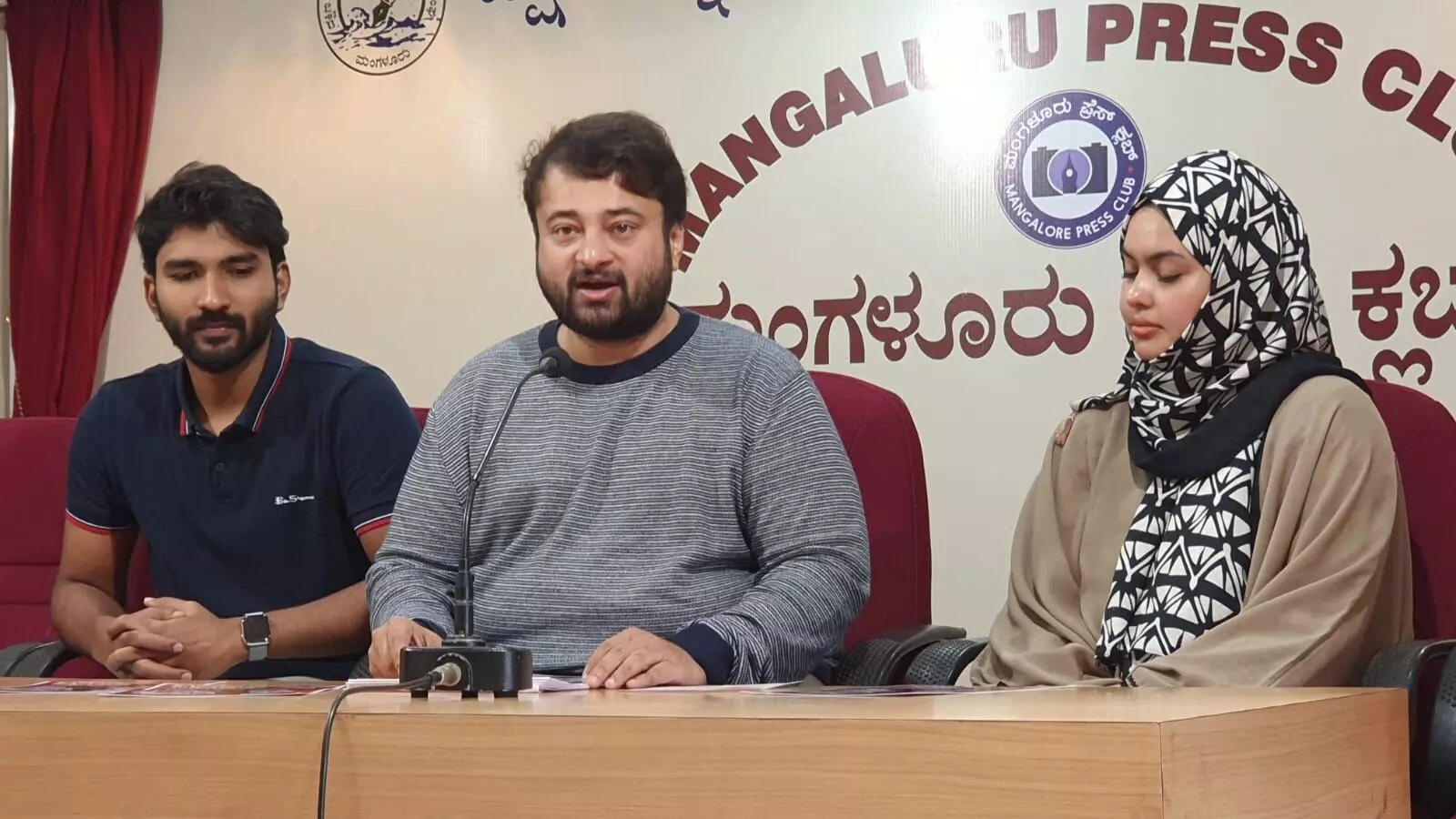Mangaluru: Motivational speaker and life coach, Saif Sultan, along with his wife, Adeela Farheen, is embarking on a remarkable mission to raise awareness about the vital importance of blood donation. The dynamic couple will undertake an arduous 4,000-kilometer motorcycle ride from Mangaluru to Kargil, aiming to spread the message of patriotism, dispel misconceptions about hijab, and highlight the significance of donating blood.
The journey is set to commence on July 29, 2023, at 7:30 am, from Nehru Maida in Mangaluru, under the auspices of esteemed dignitaries, including MLA and State Speaker U T Khader, and Mangaluru Police Commissioner Kuldeep Kumar R Jain. In preparation for their ride, a blood donation camp will be organized on July 28, in collaboration with the Blood Helpline Karnataka and the Red Cross Blood Bank. This initiative not only showcases the couple's dedication but also encourages others to contribute to this noble cause.
Riding on the BMW GS 310, the couple has made modifications to suit their travel needs before embarking on their journey. Over the course of 19 days, Saif and Adeela will traverse multiple cities, including Honnavar, Belagavi, Pune, Mumbai, Surat, Ahmedabad, Udaipur, Jaipur, Delhi, Amritsar, Jammu, and Srinagar, before reaching their destination in Kargil on August 15. Covering an average distance of 300 kilometers per day, they plan to engage with the public, promoting the importance of blood donation and distributing souvenirs and chocolates to create awareness and foster community participation.
Saif Sultan expressed, "Our primary objective is to raise awareness about blood donation. However, I also hope to dispel misconceptions surrounding the hijab and demonstrate that it is not a symbol of oppression. By showcasing my wife, Adeela, wearing the hijab during our ride, we want to emphasize that Muslim women are educated, empowered, and free to pursue their aspirations within the framework of their faith."
Reflecting on the inception of their journey, Saif shared, "Originally, I had planned a solo ride to Kargil and was preparing for a 300-kilometer ride to Karwar. But when my wife expressed her interest in joining me, I welcomed the idea with open arms. Our previous trip to Karwar was a transformative experience, allowing us to strengthen our bond and subsequently inspired us to embark on this extraordinary journey together. Our children, Hoodh, 8, and Safa, 6, are also thrilled and supportive of our adventure."
In addition to raising awareness about blood donation, the couple's expedition aims to serve as a testament to India's safety and cultural diversity. Along the way, they will document their experiences through daily blog posts, sharing their insights and encounters with the public. On reaching Kargil, the couple plans to organize a blood donation camp, where Saif will proudly donate blood for the 20th time, and Adeela will contribute for the first time.
As a symbol of solidarity and gratitude, the Indian Army personnel will witness the hoisting of flags, including the flags presented by dignitaries in Mangaluru, along with the Kannada flag on August 15. This gesture honors the memory of the late Kannada superstar Puneeth Rajkumar, with whom Saif had the privilege of meeting on three separate occasions.
This exceptional endeavor by Saif Sultan and Adeela Farheen not only promotes blood donation awareness but also sheds light on the global blood shortage crisis, which affects both low- and middle-income countries, including India. Access to safe and sufficient blood for all those in need remains a challenge worldwide. By encouraging voluntary, unpaid blood donations and fostering active community participation, we can ensure a stable blood supply, particularly during emergencies and disasters.
The couple's forthcoming plans of touring Thailand next year and Europe the following year reflect their unwavering commitment to exploring the world while advocating for noble causes.


Let the Truth be known. If you read VB and like VB, please be a VB Supporter and Help us deliver the Truth to one and all.
Mumbai (PTI): In view of Argentine superstar footballer Lionel Messi's visit to Mumbai on Sunday, the city police are implementing stringent security measures, like not allowing water bottles, metals, coins inside the stadiums and setting up watchtowers to keep an eye on the crowd, officials said.
The police also said taking extra care to avoid any stampede-like situation and to prevent recurrence of the chaotic situation that unfolded in Kolkata during Messi's visit on Saturday as thousands of fans protested inside the Salt Lake stadium here after failing to catch a clear glimpse of the football icon despite paying hefty sums for tickets.
Messi is expected to be present at the Cricket Club of India (Brabourne Stadium) in Mumbai on Sunday for a Padel GOAT Cup event followed by attending a celebrity football match. He is expected to proceed to the Wankhede Stadium for the GOAT India Tour main event around 5 pm.
"In view of Lionel Messi's visit to Mumbai, the police are geared up and have put in place a high level of security arrangements in and around the stadiums located in south Mumbai. Considering the chaos that prevailed in Kolkata and the security breach, we have deployed World Cup-level security arrangements at Brabourne and Wankhede stadiums," an official said.
Expecting heavy crowd near the stadiums during Messi's visit, the city police force has deployed more than 2,000 of its personnel near and around both the venues, he said.
As the Mumbai police have the experience of security 'bandobast' during the victory parade of ICC World Cup-winning Indian team and World Cup final match at the Wankhede Stadium, in which over one lakh cricket fans had gathered, we are prepared to handle a large crowd of fans, he said.
"We are trying to avoid the errors that occurred in the past," the official said.
There is no place to sneak inside the stadiums in Mumbai like the Kolkata stadium, according to him.
The police are also asking the organisers to provide all the required facilities to the fans inside the stadium, so that there will be no chaos, he said, adding the spectators have purchased tickets in the range of Rs 5,000 to 25,000. After paying so much of amount, any spectator expects proper services, while enjoying the event, he said.
The police are expecting 33,000 spectators at the Wankhede Stadium and over 4,000 at Brabourne Stadium. Besides this, more than 30,000 people are expected outside and around the stadiums just to have a glimpse of the football sensation, he said.
The organisers responsible for Messi's India visit recently came to Mumbai to discuss security arrangements. During the meeting, the Mumbai police asked them not to take the event lightly, according to the official.
After those requirements were fulfilled, the final security deployment was chalked out, he said.
Police has the standard procedure of the security arrangements inside the Wankhede Stadium, where people are barred from taking water bottles, metals objects, coins. Police are setting up watch towers near the stadiums and there will be traffic diversions, so that there is maximum space available to stand, according to the official.
Police are also appealing to the spectators to use public transport service for commuting and avoid personal vehicles to reach south Mumbai.
To avoid any stampede-like situation, police are also taking precautionary measures and will stop the fans some distance ahead of the stadium and public announcement systems will be used to guide the crowd. Barricades will be placed at various places to manage the crowd.
In case the crowd swells up beyond expectation, the police will divert people to other grounds and preparations in this regard underway, he said.
Additional police force has been deployed in south Mumbai to tackle any kind of situation, he said.





